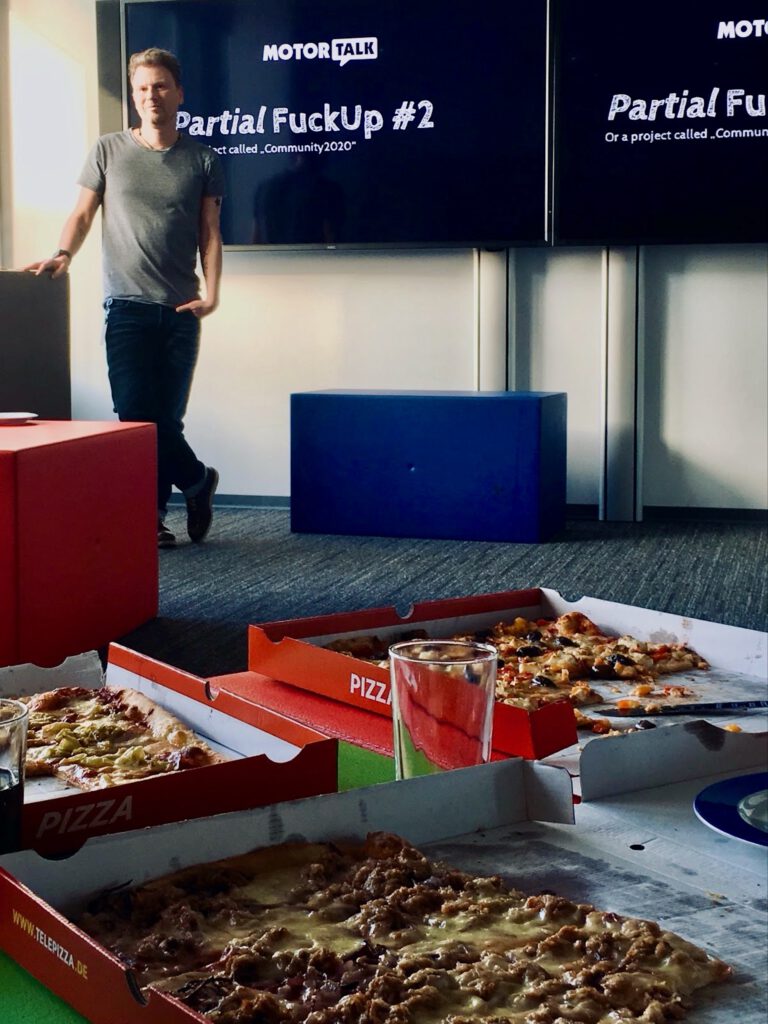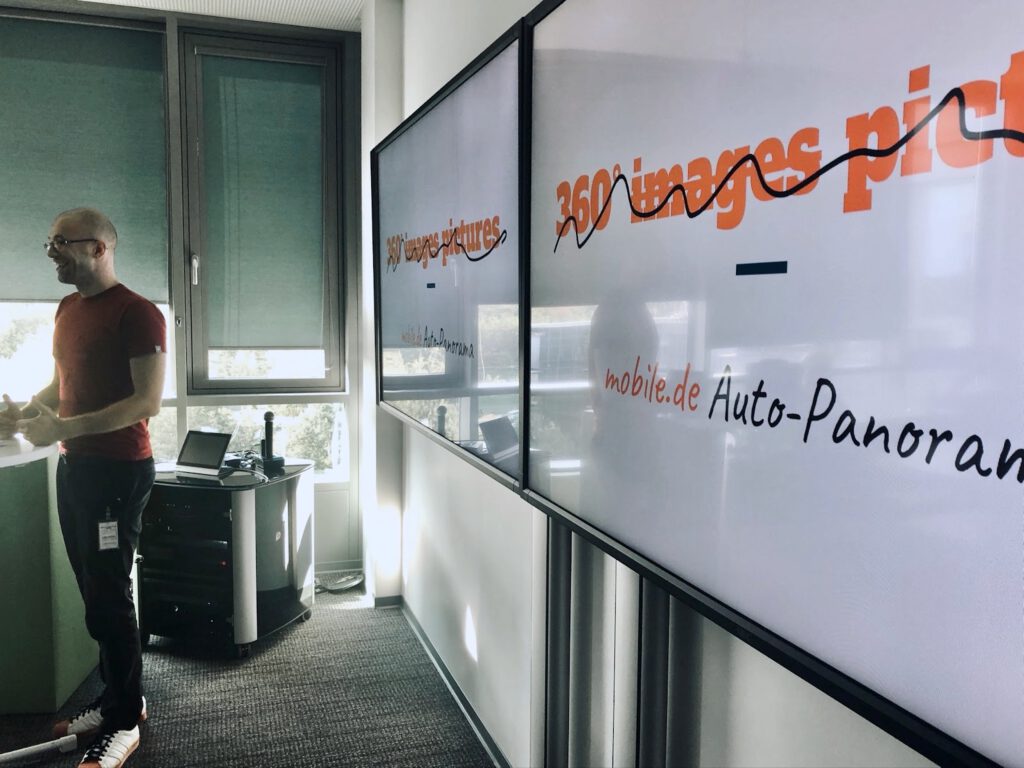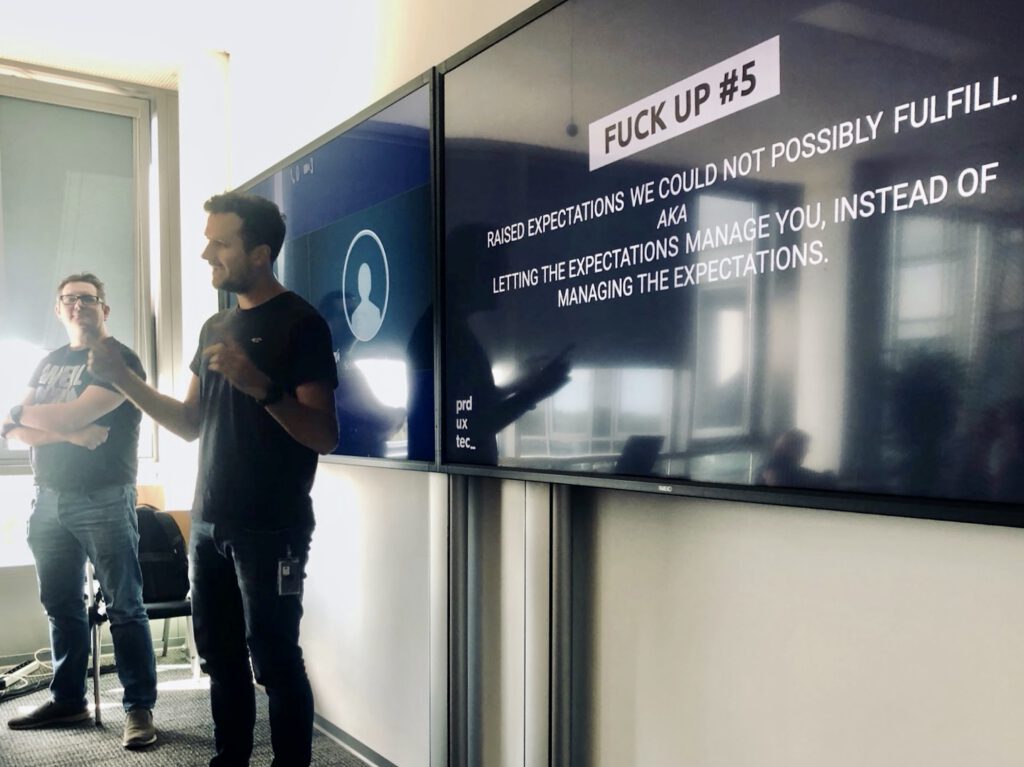Table of Contents
TL;DR – Fail Fast @ mobile.de
Everyone talks about learning, but few talk about failure – even though they go hand in hand. At mobile.de, the “Fail Fast” format (originally inspired by Fuckup Nights) created a safe space to openly share and reflect on failures. The goal: build a true learning culture.
What worked?
- Start small (MVP) and scale iteratively
- Involve leadership from the beginning
- Flexible formats + focus on interaction and fun
- Establish a regular rhythm (e.g. quarterly)
- Role modeling by leadership changes how failure is perceived
The result
What started as a small experiment turned into a company-wide event with up to 100 participants – and a real cultural shift in how failure is embraced.
It all started somewhere in Mexico
According to legend, five friends in Mexico had a drunken night and lots of discussions about their entrepreneurial experiences. They wondered why people only talk about the successes of Zuckerbergs and Gateses of the world but never share their own failures. This led to a global movement within a few years, known as the Fuckup Nights (visit fuckupnights.com).
From Mexico back to Berlin
While the concept of Fuckup Nights is commonly associated with failed business models in the startup scene, it has now made its way into established companies as well. An illustration of this is the Otto Group, a market leader in mail-order retail for over 70 years. The first event of this kind and the showcased Failures were even shared with the public on the company’s blog.
We’re not yet 70 years old, but like all companies, we must constantly evolve and learn. The shift towards agile values and ways of working has greatly sped up at mobile.de in recent years, enabling us to try out and experiment with much more. These experiments occur not only on our platform but also in terms of our organizational structure, communication, and meeting and presentation formats.
Fail Quickly – the initial steps
The initiative began in 2018 within our Product and Tech departments. As we delved deeper into the need for a comprehensive agile transformation, we realised the focus had often been on successes rather than failures.
There was no designated space or format for discussing failures beyond internal retrospectives within the team. This posed a risk of missing an opportunity to consistently enhance our organisation and shift towards a culture of learning rather than one of blame.

Just as in agile product development, when introducing new formats and ceremonies, it is important to follow the principle of Build-Measure-Learn. In our case, we conducted a pilot with a small group interested in the topic of a learning organisation, in which a failure from the areas of UX, Product, and Technology was presented.
The aim was to determine whether and in what manner (duration, presentation format, and setting) we could establish a Fail Night at mobile.de.
Fail quickly – let’s just get started
At the initial official Fuckup Night a few weeks later, our focus was solely on the Product and Tech department. We planned to gradually involve other areas of the company upon a successful launch. Following the trial run, we established the following criteria as a framework:
- Context ideally related to mobile.de – but not mandatory
- Presentation duration per story: max. 7–10 minutes
- Story content: 1. Background, 2. Failure in detail, 3. Key learnings
- Format is up to you – PowerPoint, free storytelling, role-play, etc.
- Fun and interaction come first!
The duration allocated was 60 minutes (comprising three stories), followed by a brief panel discussion on the topic of Learning Organisation. To enhance both the format’s appeal and the sense of community, refreshments in the form of drinks and pizza were provided for all attendees.

The planning team felt a lot of tension as we were unsure whether the format would generate interest. The session turned out to be a great success. We had 30 colleagues present and received a clear Go to organize more Fuckup Nights.
Fail Fast – Time to scale up!
In the initial sessions, we had to approach colleagues proactively to get Failures stories on the agenda. Over time, we increasingly received requests from the teams, indicating a greater willingness to share failures with a larger group.

We scheduled the Fuckup Night to take place once every quarter, inviting additional stakeholders from various business sectors. The presentations and stories shared by our leaders were given special attention. It is unfortunately not common in many organisations for managers to openly discuss their mistakes, failures, and weaknesses in front of their employees.
However, when the senior management team sets this example, it can generate a significant amount of positive energy, leading to a shift in perspective where failure is no longer viewed as a flaw but as an opportunity.
Fuckup Night 2.0: Fail Fast
Then the coronavirus pandemic arrived, prompting us to reconsider our approach to the format. Crisis often presents opportunities for innovation. Rather than gathering in close quarters over beer and pizza, we had to shift to a virtual format. This change allowed us to seamlessly implement the concept across the entire company.
On some occasions, over 100 colleagues participated in the sessions. Even the management team utilised the platform to share their failures and learnings, which was highly appreciated by the employees.
Additionally, based on the feedback received, we renamed the format. Fuckup Night was changed to Fail Fast, aligning better with the core concept. Failing early also means learning from mistakes sooner and ultimately achieving success more rapidly.
Fail quickly – And what have we learned?
Fail Fast helped us share not only the failures but also the learnings from those failures in a constructive manner. While this format alone will never manage to establish a learning culture in the company, it is an important component alongside many other approaches, providing a framework for learning beyond agile team ceremonies like Retrospective and Post Mortem.
From our approach, we have learned what it takes to succeed with the Fail Fast mindset. Here are our 5 tips for you to replicate:
- Start small (aka “MVP”) and then scale
- Appoint one or more owners for developing the format
- Involve leadership early on
- Establish a regular cadence (e.g. once per quarter)
- Encourage interaction and discussion during the sessions
Now, enjoy experimenting and learning!
Book recommendation
Click, buy, and enrich me – my literature recommendation on the subject and an enlightening read on Learning Culture: A New Culture of Learning: Cultivating the Imagination for a World of Constant Change

Hero image: Confucius Temple in Beijing (China) by Martin Heckmann


Leave a Reply